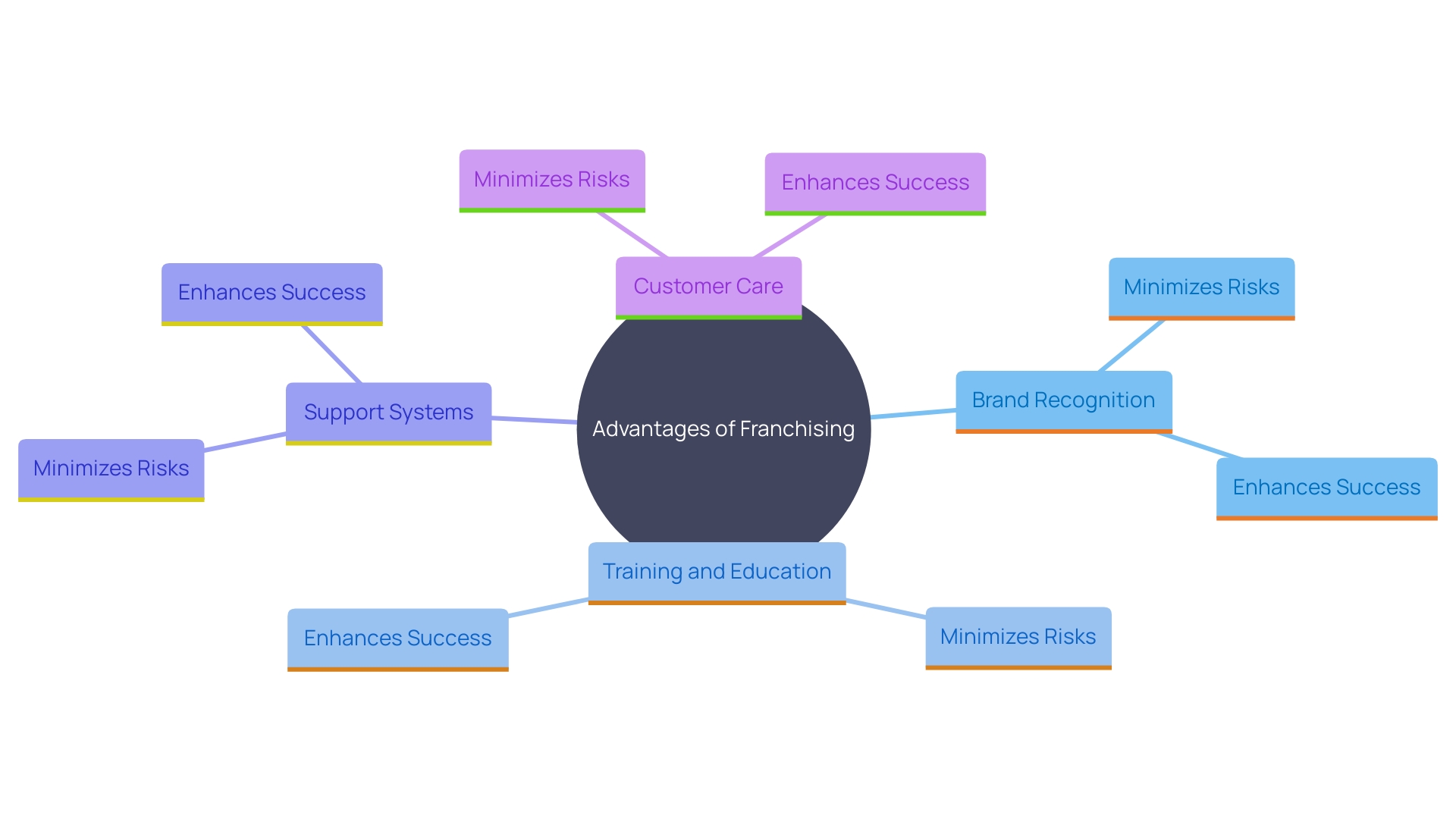Introduction
Franchising presents a unique opportunity for aspiring entrepreneurs, offering a structured path to ownership that minimizes the risks typically associated with starting a business from scratch. Beginners benefit from established brand recognition, comprehensive training programs, and ongoing support, which can significantly accelerate their success. Recognized brands come with built-in consumer trust and familiarity, attracting more customers from the outset and providing a solid foundation for growth.
The franchise model is particularly advantageous for those new to business ownership, as it includes robust training and continuous education. This ensures franchisees are well-equipped to handle various aspects of the business, from operations to marketing. The inherent support system, including detailed operations manuals and financial management tools, further ensures that franchisees are prepared to succeed.
Additionally, the article explores various franchise opportunities suitable for low investment, highlighting sectors such as food and beverage, home services, and retail. It also identifies top franchise categories for beginners in 2024, including health and wellness, cleaning services, and pet-related businesses. For those looking to invest under $50,000, options like mobile car wash services, vending machine operations, and home-based consulting services offer accessible entry points.
Finally, the article delves into detailed franchise options and selection criteria, emphasizing the importance of evaluating startup costs, location requirements, training programs, market demand, and personal alignment with the franchise’s offerings. This comprehensive guide aims to equip potential franchisees with the knowledge needed to make informed decisions and embark on a successful franchising journey.
Benefits of Franchising for Beginners
Franchising offers a structured pathway to entrepreneurship, minimizing the risks often associated with starting a business from scratch. Novices gain from recognized company reputation, thorough training initiatives, and continuous assistance, which can greatly speed up their learning process and enhance the chances of success. Established brands come with consumer trust and familiarity, attracting more customers from the outset. This recognition translates to increased foot traffic and client loyalty, giving new business owners a head start.
Moreover, business models provide robust training and continuous education. As Jimmie Meece, Brand President at America’s Swimming Pool Company, points out, “I believe the greatest resources we offer are the initial training and the continuing education opportunities to keep learning and growing. With a franchise, you’re never starting from scratch.” This guidance is echoed by Scott Walker, Brand President and Co-Founder of Screenmobile, who adds, “Franchises with a national footprint provide products, services and education to franchisees that an individual operator wouldn’t have the expertise to offer.”
In addition to brand recognition and training, the inherent support system is invaluable. Franchise headquarters often provide detailed operations manuals and financial management tools. This support ensures that franchisees are well-equipped to handle various aspects of their operations, from marketing to payroll management. The customer-centered strategy found in numerous businesses also highlights the significance of outstanding client care in fostering repeat patronage and overall achievement.

Types of Franchises Suitable for Low Investment
There are numerous business opportunities that don’t require a large financial commitment. Categories like food and beverage, home services, and retail often provide business opportunities with lower startup costs. These businesses can frequently be operated from smaller spaces, making them an attractive option for new entrepreneurs. For instance, mobile businesses have become increasingly popular as they eliminate the need for a traditional storefront, further reducing initial investments. This trend is motivated by the need for convenience, enabling franchisees to deliver offerings directly to customers. Furthermore, technology businesses are gaining traction due to the growing reliance on digital tools and smart devices. These sectors provide accessible entry points for those looking to start their franchising journey without substantial upfront costs.

Top Franchise Categories for Beginners in 2024
‘In 2024, some of the most promising business categories for low investment include health and wellness, cleaning options, and pet-related enterprises.’. Health and wellness businesses continue to thrive, leveraging their solid brand recognition and expanding footprints. Notable companies in this sector have shown remarkable sales growth, making them attractive options for potential franchisees.
Cleaning businesses franchises are also experiencing robust growth. These enterprises address a diverse array of clients, encompassing commercial venues and residential properties, providing assistance from carpet cleaning to janitorial tasks. This sector’s steady expansion makes it a reliable investment choice.
Pet-related businesses are booming, driven by the increasing number of pet parents and rising disposable incomes. The pet care market is expected to attain $28.93 billion by 2027, expanding at a compound annual growth rate (CAGR) of 9.0%. ‘This increase is driven by the rising need for high-quality pet care offerings, making pet businesses a profitable choice for hopeful entrepreneurs.’.
Low-Cost Franchise Opportunities Under $50,000
For those looking to start a franchise with an initial investment of less than $50,000, there are several promising options to consider. Mobile car cleaning options, for example, offer the distinct benefit of delivering the operation straight to the client, removing the necessity for costly properties and lowering operating expenses. Similarly, vending machine operations offer a low-investment opportunity with high demand, as these machines can be placed in a variety of high-traffic locations like office buildings, malls, and schools. This enterprise model requires minimal staffing and allows for flexible management.
Another cost-effective option is home-based consulting services. These enterprises utilize the consultant’s knowledge to offer valuable guidance to companies, all while functioning from the comfort of home. This not only cuts down on commuting costs but also offers the potential for high scalability. With the increasing trend towards remote work, home-based businesses have gained traction, making them a viable and low-cost entry into the business sector.
These economical business opportunities enable hopeful business owners to manage their financial future with a reasonably small investment, all while gaining from the established name recognition and support systems offered by the franchisor.
Detailed Franchise Options
When investigating business opportunities, it’s vital to assess each brand’s reputation, support infrastructure, and profitability potential. Fast food franchises like Subway, Dunkin’, and Servpro offer appealing entry points due to their lower initial investments and strong support systems. Subway, for instance, has become a global staple with its franchisees earning an average net income of $30,000 to $70,000 annually, thanks to a robust training program and effective marketing strategies. Dunkin’ and Servpro similarly provide comprehensive training and marketing support, helping franchisees navigate the challenges of starting and growing their businesses. These companies leverage their well-established operational systems and recognition to offer franchisees a solid foundation for success.
Franchise Selection Criteria
Choosing the right franchise involves a comprehensive evaluation process. Begin by assessing the initial expenses, which can differ greatly based on the company’s market presence and the site of your operation. Urban settings, especially in bustling metropolises, may demand a higher outlay due to increased market saturation and operational costs.
Next, consider the importance of location requirements. A prime location can attract more foot traffic and enhance visibility, which is crucial for success. Evaluate the training programs provided by the franchisor, as high-quality training guarantees you and your team are well-equipped to uphold the organization’s standards and provide outstanding customer service.
Market demand is another critical factor. Recognized labels can be a significant advantage, as consumers often associate well-known names with quality and reliability. This familiarity can lead to increased foot traffic and customer loyalty, giving you a head start in building a customer base.
Potential business owners should also align the offerings with their personal interests and skills. Having an understanding and appreciation of the brand’s essence, along with a robust business acumen, is crucial. As one expert observes, “Operating a chain is not solely about adhering to the operations manual.”. It’s about managing finances, handling marketing, and leading a team.”
Additionally, consider the network of support offered by the business system. The community of fellow franchisees can offer valuable advice and foster a collaborative environment for business growth. Certain businesses also offer unique lending initiatives, making financing more attainable.
In summary, selecting the appropriate business opportunity requires careful consideration of financial commitments, location, training, market demand, and alignment with personal interests and skills. This thorough evaluation will help ensure a successful and rewarding franchise experience.
Conclusion
Franchising presents a compelling opportunity for aspiring entrepreneurs, particularly those new to business ownership. The structured pathway it offers significantly reduces the risks associated with starting from scratch, while established brand recognition, comprehensive training, and ongoing support create an environment conducive to success. The insights from industry leaders underscore the value of training and support systems, which equip franchisees with the necessary tools to thrive in a competitive marketplace.
For those seeking low-investment options, various franchise categories such as food and beverage, home services, and pet-related businesses stand out as promising avenues. The rise of mobile franchises and technology-based opportunities further enhances accessibility for new entrepreneurs, allowing them to enter the market with reduced financial commitments. Notably, sectors like health and wellness, cleaning services, and pet care continue to show robust growth, making them attractive choices for investments in 2024.
Evaluating franchise opportunities involves careful analysis of startup costs, location requirements, and training programs, all of which play a crucial role in determining potential success. Established brands with proven business models provide a solid foundation for franchisees, while aligning personal interests with the franchise’s offerings can enhance both satisfaction and performance in the long run. Ultimately, a thorough selection process that considers financial commitments, market demand, and support networks is essential for ensuring a rewarding franchise journey.


